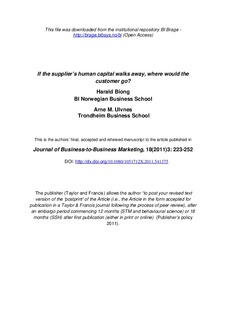If the supplier’s human capital walks away, where would the customer go?
Journal article, Peer reviewed
Permanent lenke
http://hdl.handle.net/11250/93468Utgivelsesdato
2011Metadata
Vis full innførselSamlinger
- Scientific articles [2181]
Originalversjon
10.1080/1051712X.2011.541375Sammendrag
Purpose: Professional service firms’ clients often develop stronger attachments to their key contact employee than to the service firm. Since professionals are highly mobile, buyers of professional business services constantly have to decide whether to follow their key contact employee or remain with their incumbent firm, while service firms face the threat of losing customers if the employee leaves. This study examines how the key contact employee’s human capital, the social capital between the contact employee and the client, and the service company’s structural capital affect the decision whether to follow the key contact employee to another professional service firm.
Methodology/Approach: The model is tested on a sample of 120 organizational buyers of advertising services by using partial last squares (PLS) - a structural equation modelling technique.
Findings: Professional service firms’ investments in company specific structural capital create a deterrent for clients to follow the contact employee, because remaining with the service firm will increase clients’ return on the service providers’ structural capital. Furthermore, higher levels of structural capital reduce the value of the contact employee’s investments in human capital should the employee leave. Conversely, human capital creates motivation to follow the contact employee, while social capital only provides value in combination with human capital.
Research Implications: This study employs concepts developed in economics and economic sociology rather than relationship marketing variables to examine attachments to individual professional service providers and to professional service firms.
Practical Implications: The findings underline the importance of competence, both at the company and individual level, for retaining clients of professional services. These results contrast previous studies emphasizing close interpersonal relationships and service firms’ relationship building activities.
Originality/Value/Contribution of the Paper: Human, social, and structural capital provide value to clients and therefore apply well to professional services. Hence, these variables provide alternative explanations to service firms’ client retention or desertion than traditional relationship marketing variables do. The findings add to our understanding of service provider-client relationships in professional services and knowledge intensive firms.
Beskrivelse
This is the authors’ final, accepted and refereed manuscript to the article
